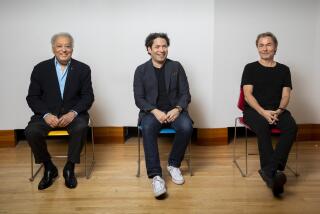MUSIC REVIEW : Andras Schiff in Recital at Pavilion
Gentlemanly, resourceful, intelligent and accomplished, the playing of Andras Schiff is the very model of prevailing international pianistic standards in the 1990s.
And yet: Schiffâs admirable pianism, demonstrated Monday night at his second Los Angeles-area recital--the first was at Ambassador Auditorium in February of last year--is another reminder that we live in an age of high achievers, not of musical giants.
As far as it goes, Schiffâs accomplishment at the keyboard is considerable. He commands that range of styles, arsenal of techniques and generous fluency toward which all conservatory graduates aspire. He is as much at home in Bach as in Bartok; indeed, those names describe two of his specialties.
But. Monday night, before a large and enthusiastic crowd in the Dorothy Chandler Pavilion--before the evening was over, its enthusiasm was much dampened--Schiff gave a Beethoven/Schumann program of low projection, untouched feelings and neutral compulsion. How the 37-year-old, Hungarian-born musician feels about this music remains, after the event, a mystery. In any case, he does not seem to share his reactions.
What one heard, then, was the shell of a performance--reliable and solid technical means, a sense of styles competently traversed, musical honesty.
In his first half, devoted to Beethovenâs B-flat Sonata, Opus 22, and the Bagatelles of Opus 126, Schiff offered these virtues, and they were not enough.
The real charms and deep subtexts of the outwardly superficial Opus 22 never materialized--as they had when Ivo Pogorelich resurrected the work, vividly, at an Ambassador Auditorium recital in 1987. Nor did Schiffâs playing of the Bagatelles, which ought to reveal the composerâs thought processes as well as the byways of his creativity, tell us much about Beethoven, or about Schiff.
There were glimmers of emotion in the performances of two cherishable and seldom-heard pieces by Robert Schumann.
In the âArabeske,â, Opus 18, Schiffâs low-energy approach proved almost touching in its simplicity. In âBlumenstuck,â Opus 19, understatement turned to blandness; one heard the notes, pleasantly played, but not the music.
Finally, in the program-closing Symphonic Etudes, Schiff produced nicely thought-out, dutifully contrasting and clean readings. At no point did he demonstrate why this music is important to him, or to the world, but he did play it neatly.
More to Read
The biggest entertainment stories
Get our big stories about Hollywood, film, television, music, arts, culture and more right in your inbox as soon as they publish.
You may occasionally receive promotional content from the Los Angeles Times.










